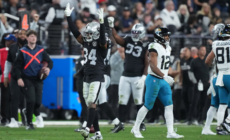-
Multiple Casualties Reported after Car Drives into Crowd in St Louis - 39 mins ago
-
China Hits Back at US Over Nuclear Weapons Alarm - about 1 hour ago
-
Honda and Nissan Unveil Merger Talks as Global Competition Bears Down - about 1 hour ago
-
Donald Trump Taunts Panama: ‘Welcome To The United States Canal’ - 2 hours ago
-
Mets Sign Free Agent Pitcher Sean Manaea to $75 Million Contract: Reports - 2 hours ago
-
‘I Was Destroyed by It’: 4 Men on Abuse at Ireland’s Catholic Schools - 3 hours ago
-
Week 16 Sees Raiders Play Way Out Of Landing Top QB In NFL Draft - 3 hours ago
-
Former WWE Champion Addresses Potential Royal Rumble Return - 4 hours ago
-
Trump and Biden, Make the Hostages Your Priority - 4 hours ago
-
Costco Guys More Popular Than Roman Reigns, Says Former AEW Superstar - 4 hours ago
Tim Walz-JD Vance VP Debate Ratings Compared to Kamala Harris-Mike Pence
The debate between Democratic Minnesota Governor Tim Walz and Republican U.S. Senator JD Vance of Ohio saw a sharp decline in viewership compared to the 2020 vice presidential debate.
Viewing figures released by Nielsen on Wednesday showed that 43.1 million people tuned in to watch the Tuesday night event. In 2020, 57.9 million people witnessed Democratic Vice President Kamala Harris, then a U.S. senator, face off against GOP Vice President Mike Pence.
While the Walz-Vance debate, which was noted for being a relatively civil affair, was viewed by almost 25 percent less people than its predecessor, the Harris-Pence debate was also the second-most watched VP debate since Nielsen began keeping records.
The most-watched debate among presidential running mates was the 2008 clash between Democratic President Joe Biden, at the time a long-serving senator, and then-Republican Alaska Governor Sarah Palin, which had 69.9 million viewers.

Anna Moneymaker; Noam Galai/WireImage
Ratings for Tuesday’s debate were similar to the 2004 vice presidential debate between then-GOP Vice President Dick Cheney and then-Democratic U.S. Senator John Edwards of North Carolina, which was watched by 43.6 million.
Both of this year’s presidential debates drew far more viewers than the Walz-Vance debate. The September 10 on-screen matchup between Harris and former Republican President Donald Trump was viewed by 67.1 million people, while the June 27 Trump-Biden debate had 51.2 million viewers.
Newsweek reached out for comment to the Trump-Vance and Harris-Walz campaigns via email on Wednesday night.
Tuesday’s debate was likely the last debate between candidates from the major party presidential tickets this year, with Trump having repeatedly refused to take part in future debates with Harris.
While polls showed that a clear majority of Americans thought that Harris won her debate with Trump, polls concerning the winner of the vice presidential debate were less clear.
A CNN/SSRS flash poll found that 51 percent of debate watchers thought that Vance won the night, while 49 percent favored Walz. Both candidates significantly improved their favorability ratings after the debate.
A similar poll from CBS News/YouGov also showed that Vance was considered the winner by a very slim margin, 42 percent to 41 percent, while 17 percent of respondents said the debate was a draw.
Debate watchers were evenly split in a Politico snap poll, with Walz and Vance each being viewed as the winner by 50 percent of respondents.
But Walz won among independent voters in the Politico poll by a margin of by 58 percent to 42 percent, and he received a larger boost to his favorability rating in the CNN poll.
Christopher Devine, associate professor of political science at the University of Dayton, previously predicted that the Walz-Vance debate would not be “won” decisively by either candidate in comments to Newsweek.
“It’s hard to really ‘win’ a debate these days because the electorate is so polarized and eager to believe that their party’s candidate got the better of the other side,” Devine said. “This debate will probably be something of a draw, with Republicans believing Vance won and Democrats believing Walz won.”
“Folks in the middle might favor one or the other, but there aren’t enough of them to give either candidate a decisive win if partisans stand by their man,” he added.
Source link





















